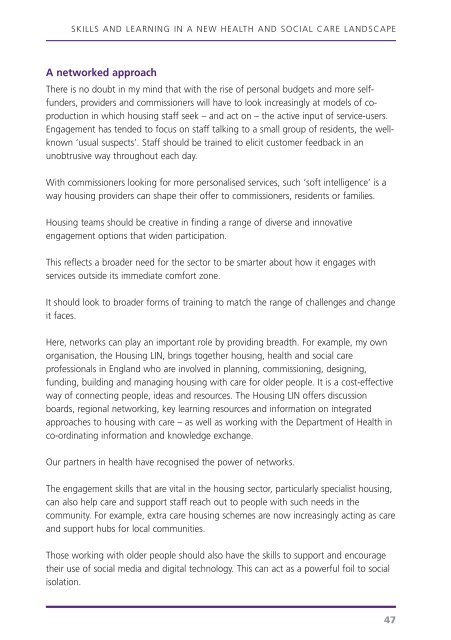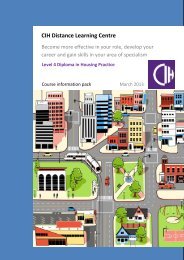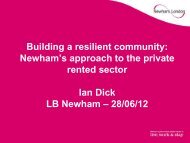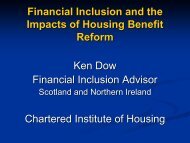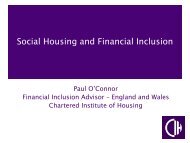View publication - Chartered Institute of Housing
View publication - Chartered Institute of Housing
View publication - Chartered Institute of Housing
You also want an ePaper? Increase the reach of your titles
YUMPU automatically turns print PDFs into web optimized ePapers that Google loves.
SKILLS AND LEARNING IN A NEW HEALTH AND SOCIAL CARE LANDSCAPE<br />
A networked approach<br />
There is no doubt in my mind that with the rise <strong>of</strong> personal budgets and more selffunders,<br />
providers and commissioners will have to look increasingly at models <strong>of</strong> coproduction<br />
in which housing staff seek – and act on – the active input <strong>of</strong> service-users.<br />
Engagement has tended to focus on staff talking to a small group <strong>of</strong> residents, the wellknown<br />
‘usual suspects’. Staff should be trained to elicit customer feedback in an<br />
unobtrusive way throughout each day.<br />
With commissioners looking for more personalised services, such ‘s<strong>of</strong>t intelligence’ is a<br />
way housing providers can shape their <strong>of</strong>fer to commissioners, residents or families.<br />
<strong>Housing</strong> teams should be creative in finding a range <strong>of</strong> diverse and innovative<br />
engagement options that widen participation.<br />
This reflects a broader need for the sector to be smarter about how it engages with<br />
services outside its immediate comfort zone.<br />
It should look to broader forms <strong>of</strong> training to match the range <strong>of</strong> challenges and change<br />
it faces.<br />
Here, networks can play an important role by providing breadth. For example, my own<br />
organisation, the <strong>Housing</strong> LIN, brings together housing, health and social care<br />
pr<strong>of</strong>essionals in England who are involved in planning, commissioning, designing,<br />
funding, building and managing housing with care for older people. It is a cost-effective<br />
way <strong>of</strong> connecting people, ideas and resources. The <strong>Housing</strong> LIN <strong>of</strong>fers discussion<br />
boards, regional networking, key learning resources and information on integrated<br />
approaches to housing with care – as well as working with the Department <strong>of</strong> Health in<br />
co-ordinating information and knowledge exchange.<br />
Our partners in health have recognised the power <strong>of</strong> networks.<br />
The engagement skills that are vital in the housing sector, particularly specialist housing,<br />
can also help care and support staff reach out to people with such needs in the<br />
community. For example, extra care housing schemes are now increasingly acting as care<br />
and support hubs for local communities.<br />
Those working with older people should also have the skills to support and encourage<br />
their use <strong>of</strong> social media and digital technology. This can act as a powerful foil to social<br />
isolation.<br />
47


